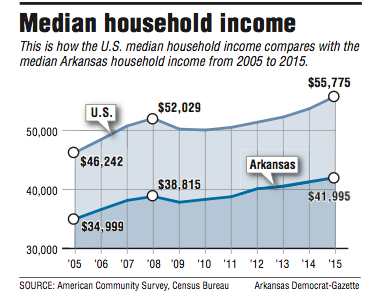Arkansas' median household income was the second-lowest in the country last year, according to the U.S. Census Bureau's American Community Survey released Thursday.
Arkansas' 2015 median household income was $41,995, ahead of only Mississippi's income of $40,593. Median means half the household incomes in Arkansas were above $41,995 and half were below it.
The state with the highest median household income was Maryland at $75,847.
The median household income in Arkansas was up only 1.7 percent from $41,302 in 2014, one of the four lowest increases in the country, ahead of only New Jersey with a 0.3 percent gain, Idaho, which gained 0.8 percent, and New Mexico, which improved 1.2 percent.
Arkansas dropped one spot from 48th in 2014, when its household income was ahead of West Virginia and Mississippi.
The figures are in 2015 inflation-adjusted dollars.
"This is not good news, obviously," said Kathy Deck, director of the Center for Business and Economic Research at the University of Arkansas in Fayetteville.
The national median household income, according to the American Community Survey, was $55,775, or $13,780 higher than Arkansas' median income. Median household income nationally rose 3.8 percent in 2015. The national median household income reported in the American Community Survey differs from the median income reported Tuesday in a story about the Census Bureau's Current Population Survey for 2015.
There was a significant increase in median household income at the national level and for 39 states, the Census Bureau said in the Thursday report.
Arkansas' slight increase in median household income was discouraging, Deck said. "Arkansas employment began to pick up near the end of 2015 and into 2016," she said. "So it may be that we'll see a bit of a bump next year."
Arkansas' lower cost of living tempers the lower income numbers, said Michael Pakko, chief economist at the Institute for Economic Advancement at the University of Arkansas at Little Rock. The state's cost of living is 12.5 percent below the national average.
"Because prices in Arkansas are among the lowest in the nation, the purchasing power of incomes in Arkansas is far closer to the national average than incomes would suggest," Pakko said.
The biggest contributor to Arkansas' lower cost of living is housing costs, said John Shelnutt, the administrator for economic analysis and tax research for the state's Department of Finance and Administration.
Arkansas, Missouri and Mississippi typically have noticeably lower housing costs compared with the rest of the country, Shelnutt said. Housing costs include owner-occupied homes as well as rental units, Shelnutt said.
"The cost of living can't be discounted but generally cost of living is higher in places where people have indicated they want to be," Deck said.
The median household income differs from a state's per capita income.
The median household income includes the combined incomes of everyone in a home, divided by how many households are in the state. The Census Bureau tabulates the data through monthly surveys with more than 2 million interviews nationally and almost 22,500 interviews in Arkansas.
Per capita income includes all the income earned in a state divided by the total population, including children.
Per capita income, as calculated by the U.S. Bureau of Economic Analysis, includes several income categories that the household income survey does not, Pakko said. Those include government assistance that isn't cash payments, such as food stamps or housing subsidies, Pakko said.
Arkansas' per capita income last year was $39,107, about 82 percent of the U.S. average of $47,669. Arkansas ranked 41st among the states in per capita income last year.
No matter the measurement used, Arkansas generally is considered to be a relatively low-income state, Pakko said.
Improving Arkansas' income level is "all about investment and giving a chance for those investments to pay off," Deck said. "In our state right now, there are large investments in highway [improvements]. There are specific investments being made in our children, particularly in computer coding to make Arkansas children the workforce of the future with skills that perhaps their competitors from other states won't have. There are also investments in universities, in good water and good wastewater."
The simple answer, Pakko said, is that Arkansas has to grow faster than the rest of the country to catch up.
"During this recovery, [Arkansas] has more or less been growing at the same pace as the rest of the nation," Pakko said. "This year, the national average income was a very large increase. Arkansas' [increase] was certainly not as robust at 1.7 percent."
Business on 09/16/2016
